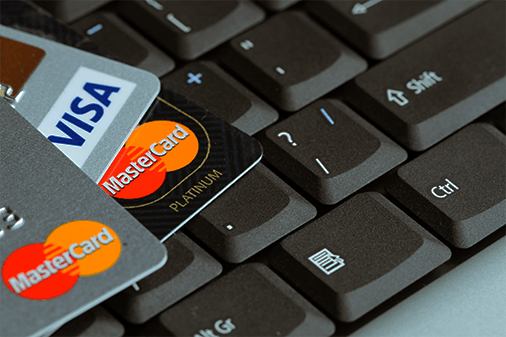In this article
Check your credit score today
Check your score and get tips to improve it. It’s free, forever.
How do hackers steal credit card data?
Protect yourself against your credit card details being stolen. Read on to find out.

In this article
Check your credit score today
Check your score and get tips to improve it. It’s free, forever.
Ever wondered how bank cards get hacked even though the physical card is still sitting intact in your wallet? With cyber crimes becoming more sophisticated, there is an increased risk of your credit card details getting stolen and misused.
Learning how hackers get credit card information and understanding the steps you can take to protect yourself against identity theft can keep you safe. Read on to know more:
There are plenty of ways scammers employ while hacking a credit card. Here are a few you should be aware of:
Phishing emails
One of the most common ways of executing credit card hacks is by sending phishing emails to unsuspecting recipients.
While these emails look official on the face of it, in reality, they are fraudulent messages sent with the nefarious intent of stealing credit card details. The emails are written so that you get lured into clicking a button or link that redirects you to a familiar-looking fraudulent website where you enter your card details, and scammers record the same.
For instance, you may receive an email informing you that you have qualified for a free low-interest credit card from your current issuer, tempting you to click on the button to process your application. But once you enter current card details as prompted, a scammer may get their hand over the sensitive information.
Phishing can also be executed for hacking credit cards by sending an urgent but bogus email, forcing you to call a fraudulent number. You may think you are calling your credit card company or another important authority and providing your credit card details to confirm your identity. But you may soon discover that your credit card has been hacked as fraudsters record the confidential card information shared.
Spyware
Downloading or opening a file from an unknown website or an email can install spyware on your computer or phone..
And how do thieves use stolen credit card details? Once the details are exported through spyware, thieves can use the data to make purchases online or in-store.
That’s why experts recommend downloading strong anti-spyware software on your devices and never opening emails from unknown or suspicious addresses or clicking on questionable websites.
Public WiFi networks
Using public internet networks increases the chances of leaked credit card details, as there is a chance someone may be illegally monitoring the network. When you enter your card details on a website using such a network, someone may track the information and use it for fraudulent purposes.
Data breach
Data privacy is an essential concern for large conglomerates and businesses such as credit card companies. However, sometimes such institutions are at risk for massive data breaches resulting in credit cards getting hacked. This puts your critical personal information at risk.
Data breaches happen when a cyber-criminal infiltrates the data source of an organisation and extracts sensitive information such as credit card details. Even though most organisations encrypt all sensitive information, and it is impossible to decode credit card numbers, security lapses may make it easier for criminals to access such data on a large scale.
Installing skimmers
Devices called skimmers installed at ATMs and card swiping machines at retail outlets can also help fraudsters in credit card hacking. Such devices collect important information from the magnetic strip of the card and clone your card. After that, scammers use the clone card and swipe it at point-of-sale to carry out a fraudulent transaction.
Shoulder surfing
Some hackers don’t even use sophisticated technology to steal credit card details. A person may simply watch a user enter the credit card's PIN at an ATM or a retail outlet and note down the card number. It can also be done from afar using specialised binoculars.
Here are some ways to check whether a credit card has been hacked or not:
Credit Reports
Regularly reviewing your credit reports can help you detect whether there has been any credit card fraud. You can quickly identify any transaction that may have been done without your knowledge and raise a dispute with the credit reporting agency.
Remember that not identifying such transactions in time increases your credit card debt. Failure to pay your dues by the due date hampers your credit score, eventually forcing you to settle for credit cards for bad credit that charge an exorbitant interest rate.
Not sure how to get a copy of your credit report? Sign up with ClearScore to access your report and check credit score anytime you want.
Credit monitoring services
Several businesses provide credit monitoring services to help you stay on top of transactions carried out on your card. Once you provide access, such services track where your card is being used and scour through the internet to check if your card details are being used fraudulently anywhere. Certain credit bureaus also offer paid or free credit monitoring services that you can avail of.
However, remember that such services are no guarantee to prevent credit cards from getting hacked. It only accelerates the process of reviewing your credit card statements instead of doing the review manually.
Credit card statements
Don’t miss reviewing your credit card statements every month.
Sometimes you may dismiss a transaction, thinking it is yet another credit card fee charged to your account. But a closer look may reveal an unusual transaction that doesn’t match your spending history. Timely detection can help to bring such charges to the notice of your credit card issuer for further investigation.
If you suspect that someone has stolen your credit card, here’s what you should do immediately:
Inform your credit card company
If you suspect someone stole your credit card or your credit card details have been compromised, notify your credit card company without fail. The card company can immediately block access to your card, preventing the fraudster from carrying out any transactions.
Lodge a police report
Since credit card fraud is identity theft, you must ensure that you keep the police informed. Filing a report with your local police station is critical if your credit card is stolen or data is compromised. Even though the police may not be able to trace the thief, it is helpful to have on record that someone may try to impersonate you and purchase something.
Moreover, if you want to dispute any fraudulent charges with your credit card issuer on account of your card getting stolen, they may need you to file a police report supporting your application.
Check if the website has a secure URL
If you love to shop online, pay attention to the website URL. Enter your credit card details only if the URL has https://. HTTPS denotes a secure data exchange between the browser and the server. Entering your credit card details on an unsecured website increases the chances of scammers tracking it and hacking your card.
Install strong antivirus software and use VPNs
Are you planning to connect to the internet in a public place such as a cafe or airport and use your credit card for a transaction?
Always connect through a virtual private network or VPN, as it offers protection against hackers and malware. Ensure that the antivirus software on your system is up to date to protect you in case any harmful malware gets accidentally downloaded.
Don’t save any credit card information online
If you think saving credit card details can help you save precious seconds during a checkout, think again. Storing your credit card details on any website increases your chances of falling prey to a data breach.
Always enter your details afresh, even if that means spending a few extra minutes than anticipated.
Use strong passwords and set up two-factor authentication
Always use a hard-to-guess password and PIN for your credit card account. Ensure the password has a mix of symbols, alphabets, and numbers.
If your card issuer offers two-factor authentication to log on to your credit card account, ensure to activate it, as it provides an additional layer of security.
Never write down confidential information such as your credit card number, expiry date, CVV, or PIN online or offline. Don’t post or share pictures of your credit card where such information is visible.
Lastly, never share credit card details with friends or family, even if you trust them. If required, carry out the transaction on their behalf but refrain from handing over your card details.
Getting your credit stolen is everyone’s worst nightmare.
So always stay vigilant to prevent hackers from obtaining your card details. Apart from learning how credit cards work, be aware of the necessary steps to take to reduce the possibility of falling prey to credit card fraud.
Nidhi spreads the word about how awesome ClearScore is.
